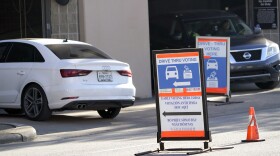Since Governor Greg Abbott declared reforming election laws as one of his emergency items, lawmakers have filed a great number of election-related bills.
State Republicans say the bills they have introduced will fix voter rolls, early voting and ID requirements that they say were prone to errors during the 2020 election.
Here's a breakdown of the dozen proposed laws the Texas Senate committee on State Affairs discussed Friday:
SENATE BILL 7: Relating to elections, including election integrity and security; creating a criminal offense; providing civil penalties.
SB 7 would limit mail-in and curbside voting laws and prohibit election clerks from encouraging voters to vote by mail. It would also require proof of disability or a doctor’s note for those who want to vote by mail, a measure that was not in place during the 2020 election.
It and companion House Bill 6 have drawn heavy criticism from opponents who see this as an assault on voting rights.
Charles Boner with MOVE Texas, a political advocacy group, said “Instead of focusing on storm recovery and the millions of Texans that went without power or water, or focusing on suppressing the virus, these folks are committed to suppressing the vote.”
MOVE Texas has issued a series of ad-buys educating Texas residents about SB7.
SENATE BILL 331: Relating to eligibility to serve as an interpreter in an election.
SB 331 would allow an interpreter, under oath, to assist with the voting process, but would not allow the interpreter to accompany a person to the ballot.
SENATE BILL 598: Relating to auditable voting systems.
SB 598 would require an audit of election results for any race or election 24 hours after it is conducted.
SENATE BILL 1018: Relating to an early voting ballot voted by mail.
SB 1018 would restrict early voting by mail, by having the applicant request the ballot in person, and placing limitations on the county clerk.
SENATE BILL 1112: Relating to signature verification on an early voting ballot voted by mail; creating a criminal offense.
SB 1112 would allow a voter to appoint a representative to sign for them, but failure to do so would result in a criminal offense.
SENATE BILL 1113: Relating to a registrar’s failure to cancel voter registrations under applicable law.
SB 1113 would allow the secretary of state to withhold funding from the county elections office if a county clerk fails to cancel ineligible voter registrations.
SENATE BILL 1114;Relating to verification of the citizenship status of certain registered voters.
SB 1114 would call on the Secretary of State’s Office to require that voter registrars cross-reference voter lists and motor vehicle records to determine if the voter is a citizen.
SENATE BILL 1116: Relating to a county, city or independent school district posting election results on an Internet website.
SB 1116 grants authority for polling places, like school districts, to post election results on the internet.
SENATE BILL 1234: Relating to a requirement that a voting system use a paper record or produce a paper receipt for verification purposes.
SB 1234 requires that all voters must be able to show a paper receipt to verify that their ballot is official and will be counted accurately.
SENATE BILL 1235: Relating to verification of the accuracy of voter registration applications and voter registration lists. SB 1235 confirms that all voter registration lists are accurate prior to an election.
SENATE BILL 1340: Relating to voter qualification and registration. SB 1340: would require the Secretary of State to act as the final arbiter on the accuracy of Texas voters. Currently, many larger counties do not maintain voter rolls.
SB 1340 would require the Secretary of State to act as the final arbiter on the accuracy of Texas voters. Currently, many larger counties do not maintain voter rolls.
SENATE BILL 1387: Relating to a requirement that a voting system used in an election in this state be manufactured, stored and held in the United States by a company headquartered in the United States. SB 1387: Requires that in order for all voting systems or voting equipment to be used, they must be manufactured or stored in the United States.
The majority of the bills are authored or are supported by at least five of the nine members on the Senate State Affairs. After hearing testimony on the bills on Friday, more hearings and a vote are expected to take place next week.
Got a tip? Email Haya Panjwani at hpanjwani@kera.org. Follow Haya on Twitter @hayapanjw.
KERA News is made possible through the generosity of our members. If you find this reporting valuable, consider making a tax-deductible gift today. Thank you.





